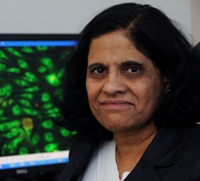
Renu A. Kowluru, Ph.D., professor of Ophthalmology, Anatomy and Cell Biology, and Endocrinology for the Wayne State University School of Medicine and the Kresge Eye Institute, has received a 12th continuous year of financial support from the Thomas Foundation to finance her diabetic retinopathy research.
The Thomas Foundation began funding Dr. Kowluru's research in 2001.
Retinopathy, the most common cause of acquired blindness in young adults and in diabetic patients, results from damage to the small blood vessels in the retina. All people with diabetes are at risk of developing retinopathy, and the risk increases the longer a person has diabetes. Between 40 percent and 45 percent of Americans with diabetes suffer from retinopathy, according to the National Eye Institute.
Studies have shown that reversing high blood sugar with normal controls fails to halt the condition's progression. The condition continues to progress even after blood sugar levels are brought to normal. Dr. Kowluru believes this suggests a "metabolic memory" phenomenon.
Her research seeks to identify cellular and molecular abnormalities in that metabolic memory phenomenon. She hypothesizes that the retinal mitochondrial DNA continues to be damaged even after normal glucose is reinstituted, and the electron transport system continues to be compromised.
Dr. Kowluru's lab is testing the role DNA damage plays in the metabolic memory phenomenon using isolated retinal capillary cells, which are the targets of histopathology associated with diabetic retinopathy.
Understanding the role of DNA damage could assist in the creation of therapies to supplement controlling blood sugar levels to slow the progression of blindness brought about by diabetes complications.